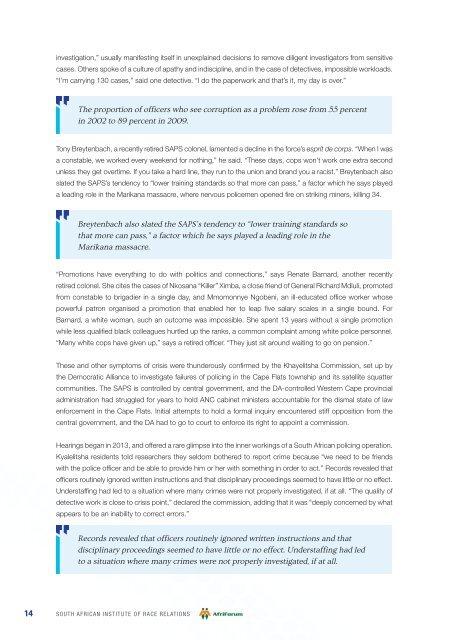2230_SAIRR_WWACinSA_sm4.indd 1 2016/09/05 5:04 PM
sairr_english_wwacinsa_print_050916
sairr_english_wwacinsa_print_050916
Create successful ePaper yourself
Turn your PDF publications into a flip-book with our unique Google optimized e-Paper software.
investigation,” usually manifesting itself in unexplained decisions to remove diligent investigators from sensitive<br />
cases. Others spoke of a culture of apathy and indiscipline, and in the case of detectives, impossible workloads.<br />
“I’m carrying 130 cases,” said one detective. “I do the paperwork and that’s it, my day is over.”<br />
The proportion of officers who see corruption as a problem rose from 55 percent<br />
in 2002 to 89 percent in 20<strong>09</strong>.<br />
Tony Breytenbach, a recently retired SAPS colonel, lamented a decline in the force’s esprit de corps. “When I was<br />
a constable, we worked every weekend for nothing,” he said. “These days, cops won’t work one extra second<br />
unless they get overtime. If you take a hard line, they run to the union and brand you a racist.” Breytenbach also<br />
slated the SAPS’s tendency to “lower training standards so that more can pass,” a factor which he says played<br />
a leading role in the Marikana massacre, where nervous policemen opened fi re on striking miners, killing 34.<br />
Breytenbach also slated the SAPS’s tendency to “lower training standards so<br />
that more can pass,” a factor which he says played a leading role in the<br />
Marikana massacre.<br />
“Promotions have everything to do with politics and connections,” says Renate Barnard, another recently<br />
retired colonel. She cites the cases of Nkosana “Killer” Ximba, a close friend of General Richard Mdluli, promoted<br />
from constable to brigadier in a single day, and Mmomonnye Ngobeni, an ill-educated offi ce worker whose<br />
powerful patron organised a promotion that enabled her to leap fi ve salary scales in a single bound. For<br />
Barnard, a white woman, such an outcome was impossible. She spent 13 years without a single promotion<br />
while less qualifi ed black colleagues hurtled up the ranks, a common complaint among white police personnel.<br />
“Many white cops have given up,” says a retired offi cer. “They just sit around waiting to go on pension.”<br />
These and other symptoms of crisis were thunderously confi rmed by the Khayelitsha Commission, set up by<br />
the Democratic Alliance to investigate failures of policing in the Cape Flats township and its satellite squatter<br />
communities. The SAPS is controlled by central government, and the DA-controlled Western Cape provincial<br />
administration had struggled for years to hold ANC cabinet ministers accountable for the dismal state of law<br />
enforcement in the Cape Flats. Initial attempts to hold a formal inquiry encountered stiff opposition from the<br />
central government, and the DA had to go to court to enforce its right to appoint a commission.<br />
Hearings began in 2013, and offered a rare glimpse into the inner workings of a South African policing operation.<br />
Kyalelitsha residents told researchers they seldom bothered to report crime because “we need to be friends<br />
with the police offi cer and be able to provide him or her with something in order to act.” Records revealed that<br />
offi cers routinely ignored written instructions and that disciplinary proceedings seemed to have little or no effect.<br />
Understaffi ng had led to a situation where many crimes were not properly investigated, if at all. “The quality of<br />
detective work is close to crisis point,” declared the commission, adding that it was “deeply concerned by what<br />
appears to be an inability to correct errors.”<br />
Records revealed that officers routinely ignored written instructions and that<br />
disciplinary proceedings seemed to have little or no effect. Understaffing had led<br />
to a situation where many crimes were not properly investigated, if at all.<br />
14<br />
SOUTH AFRICAN INSTITUTE OF RACE RELATIONS<br />
<strong>2230</strong>_<strong>SAIRR</strong>_<strong>WWACinSA</strong>_<strong>sm4.indd</strong> 14<br />
<strong>2016</strong>/<strong>09</strong>/<strong>05</strong> 5:<strong>04</strong> <strong>PM</strong>


